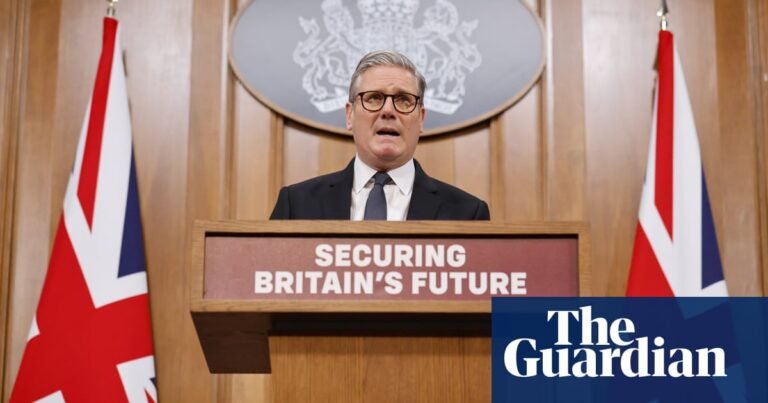Keir Starmer has said he “deeply regrets” a speech in which he described the UK as being in danger of becoming an island of strangers without tough curbs on immigration.
In an interview with the Observer, the prime minister said he should have read the speech more carefully and “held it up to the light a bit more”.
The speech, delivered in May to unveil Labour’s immigration policy, was criticised for seeming to echo Enoch Powell’s infamous 1968 “rivers of blood” speech in which Powell claimed Britain’s white population would be “strangers in their own country”.
After the speech, Starmer’s official spokesperson said the prime minister “absolutely stands by” his language, including claims that mass immigration had done “incalculable damage” to the British economy.
Keir Starmer promises net migration will fall ‘significantly’ by end of this parliament – video
However, in the interview with his biographer Tom Baldwin, Starmer said: “I wouldn’t have used those words if I had known they were, or even would be, interpreted as an echo of Powell. I had no idea – and my speechwriters didn’t know either. But that particular phrase – no, it wasn’t right. I’ll give you the honest truth: I deeply regret using it.”
In the interview, he also talked about a firebomb attack on the door of his family home in London hours before the speech. However, he stressed he was not using the attack as an excuse for the language, or blaming his advisers, saying he himself should have paid more attention.
He also acknowledged there were “problems with the language” in his foreword to the policy document that said the record numbers of immigrants entering the UK under the last government had done “incalculable damage” to the country.
He said it was the case that Labour had “become too distant from working-class people on things like immigration”, but he said: “This wasn’t the way to do it in this current environment.”
In his speech in mid-May, Starmer said: “Let me put it this way: nations depend on rules, fair rules. Sometimes they are written down, often they are not, but either way they give shape to our values, guide us towards our rights, of course, but also our responsibilities, the obligations we owe to each other.
“In a diverse nation like ours … we risk becoming an island of strangers, not a nation that walks forward together.”
Afterwards, several Labour MPs questioned whether Starmer’s policies were fuelling racism. Sarah Owen, the Labour chair of the women and equalities committee, who is of Malaysian-Chinese heritage, said: “Chasing the tail of the right risks taking our country down a very dark path. The best way to avoid becoming an ‘island of strangers’ is investing in communities to thrive, not pitting people against each other.”
Nadia Whittome said anti-migrant rhetoric from the government was “shameful and dangerous”. The Labour MP for Nottingham East said: “To suggest that Britain risks becoming ‘an island of strangers’ because of immigration mimics the scaremongering of the far right.”
skip past newsletter promotion
Get the day’s headlines and highlights emailed direct to you every morning
Privacy Notice: Newsletters may contain info about charities, online ads, and content funded by outside parties. For more information see our Privacy Policy. We use Google reCaptcha to protect our website and the Google Privacy Policy and Terms of Service apply.
after newsletter promotion
In the wide-ranging conversation, Starmer also acknowledged it was wrong of him to have appointed Sue Gray, the former senior civil servant, as his chief of staff – only for her to depart a year later and be replaced by the campaigns chief Morgan McSweeney.
He said: “Not everyone thought it was a good idea when I appointed her … It was my call, my judgment, my decision, and I got that wrong. Sue wasn’t the right person for this job.”
Quick Guide
Contact us about this story
Show
The best public interest journalism relies on first-hand accounts from people in the know.
If you have something to share on this subject you can contact us confidentially using the following methods.
Secure Messaging in the Guardian app
The Guardian app has a tool to send tips about stories. Messages are end to end encrypted and concealed within the routine activity that every Guardian mobile app performs. This prevents an observer from knowing that you are communicating with us at all, let alone what is being said.
If you don’t already have the Guardian app, download it (iOS/Android) and go to the menu. Select ‘Secure Messaging’.
SecureDrop, instant messengers, email, telephone and post
See our guide at theguardian.com/tips for alternative methods and the pros and cons of each.
Illustration: Guardian Design / Rich Cousins
Thank you for your feedback.
He also discussed the death of his brother Nickon Boxing Day last year, saying he had personally gone up to Leeds to sort out his brother’s belongings, with his security detail waiting outside.
“The previous day I had been taking calls on the future of European security and there I was, on my hands and knees with a brush scrubbing out the back of the bog,” he said. “That’s quite a good leveller … I didn’t want anyone else there. He was my brother – I didn’t want to let him down.”
Starmer has spoken in the past about his protectiveness towards Nick, who had developed learning difficulties after complications during his birth, and who died of cancer aged 60.
